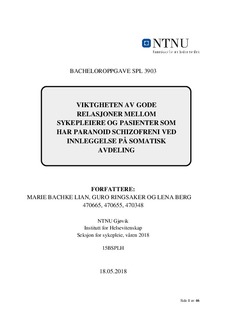| dc.contributor.advisor | Simonsen, Siri Gunn | |
| dc.contributor.author | Lian, Marie Bachke | |
| dc.contributor.author | Ringsaker, Guro | |
| dc.contributor.author | Berg, Lena | |
| dc.date.accessioned | 2018-09-03T07:03:20Z | |
| dc.date.available | 2018-09-03T07:03:20Z | |
| dc.date.issued | 2018 | |
| dc.identifier.uri | http://hdl.handle.net/11250/2560431 | |
| dc.description.abstract | Introduksjon: Pasienter som har schizofreni har en livsstil som medfører økt risiko for sykehusinnleggelse for somatiske plager. Opphold på sykehus kan være stressende for denne pasientgruppen, med økt behov for ivaretakelse og trygghet. Flere sykepleiere på somatisk sykehus gir uttrykk for negative holdninger og frykt, noe som kan påvirke evnen til å etablere en god relasjon med denne pasientgruppen. Hensikt: Belyse hva gode relasjoner har å si for pasienter som har paranoid schizofreni innlagt for somatiske lidelser, herunder hvilke faktorer som påvirker etableringen av relasjoner og spesielle utfordringer i somatikken. Metode: Oppgaven er en litteraturstudie hvor det er benyttet åtte kvalitative studier. Søk ble utført i relevante databaser for helsefag i perioden februar - april 2018. Databasene benyttet er CINAHL, PubMed, Sage Journals og Taylor & Francis Online. Søkeord: Schizophrenia, Interaction, Communication, Nurse, Mental illness, Attitudes, Knowledge, Experience, Relationship, General hospital, Nurse attitudes, Psychiatric patients, Mental health nursing, Nurse client relationship, Nurse-patient relationship, Mental disorders/diagnosis, Empathy, Psychiatric nursing, Psychiatry, Hospital. Resultat: En høy andel sykepleiere fremviste negative holdninger mot pasienter som har psykiske lidelser. Holdningene førte til frykt og unnvikelse av pasienten og var basert på kunnskapsmangel og tidligere negative erfaringer. Målrettet kommunikasjon kunne forenkle interaksjon med pasienter som har schizofreni. Kontinuitet og regelmessighet ble trukket frem som viktige faktorer i relasjonsbyggingen. Negative holdninger, frykt og kunnskapsmangel påvirket relasjonsbyggingen i negativ retning. Konklusjon: Sykepleiers holdninger, kunnskap og kommunikasjonsevner spiller en stor rolle i etableringen av relasjoner til pasienter som har paranoid schizofreni. Bevissthet rundt verbal og nonverbal kommunikasjon er nødvendig for å oppnå en god dialog med pasienten. Det er mangelfull opplæring i somatisk sykehus om ivaretakelse av pasienter som har psykiske lidelser. Økt bevissthet og kunnskap om dette temaet vil bedre sykepleien som utøves til pasienter som har paranoid schizofreni. Denne studien kan være anvendbar for relasjonsbygging uansett hvor en møter syke mennesker. | nb_NO |
| dc.description.abstract | Introduction: The lifestyle of patients that have schizophrenia leads to higher risk of hospitalization due to somatic illness. Hospitalstays can be stressful for this group of patients, which demand higher need of care and protection. Nurses at somatic wards often holds negative attitudes and fear towards this group of patients, which can influence their ability to establish relations. Aim: The aim is to illuminate the importance of good relations with patients that have paranoid schizophrenia admitted for somatic illnesses and what factors affects the establishments of relations. Special challenges in somatic wards will be enlightened. Method: This literature review used eight qualitative studies. The search for studies used databases relevant for health science in the period of February – April 2018. The databases used was CINAHL, PubMed, Sage Journals and Taylor & Francis Online. Keywords: Schizophrenia, Interaction, Communication, Nurse, Mental illness, Attitudes, Knowledge, Experience, Relationship, General hospital, Nurse attitudes, Psychiatric patients, Mental health nursing, Nurse client relationship, Nurse-patient relationship, Mental disorders/diagnosis, Empathy, Psychiatric nursing, Psychiatry, Hospital. Result: A high proportion of nurses displayed negative attitudes towards patients that have mental illnesses. Their attitudes lead to fear and avoidance of the patients. Attitudes was based on lack of knowledge and previous negative experiences. Communication skills can simplify interactions with patients that have schizophrenia. Continuity and regular contact was shown as important factors in the establishment of relations. Negative attitudes, fear and lack of knowledge affected relations negatively. Conclusion: Nurses attitudes, knowledge and communication skills played an important role when establishing relations with patients that have paranoid schizophrenia. Awareness of verbal and nonverbal communication is necessary for achieving a good dialogue with the patient. There is insufficient training of caring for patients that have mental disorders in somatic wards. Increased awareness and knowledge about this topic can lead to higher quality of nursing care for patients that have paranoid schizophrenia. This study can be useful for the establishments of relations wherever there are sick patients. | nb_NO |
| dc.language.iso | nob | nb_NO |
| dc.subject | sykepleie | nb_NO |
| dc.subject | relasjoner | nb_NO |
| dc.subject | schizofreni | nb_NO |
| dc.subject | somatikk | nb_NO |
| dc.title | Viktigheten av gode relasjoner mellom sykepleiere og pasienter som har paranoid schizofreni ved innleggelse på somatisk avdeling | nb_NO |
| dc.title.alternative | The importance of a good relationship between nurses and patients that have paranoid schizophrenia admitted to somatic ward | nb_NO |
| dc.type | Bachelor thesis | nb_NO |
| dc.subject.nsi | VDP::Medical disciplines: 700::Health sciences: 800::Nursing science: 808 | nb_NO |
| dc.source.pagenumber | 46 | nb_NO |
